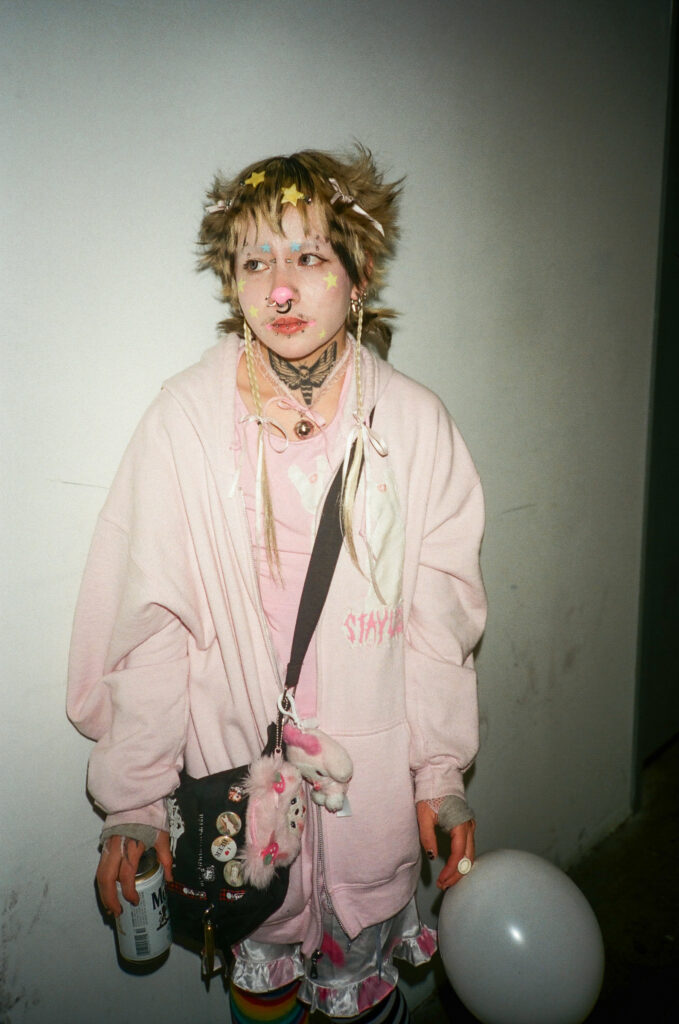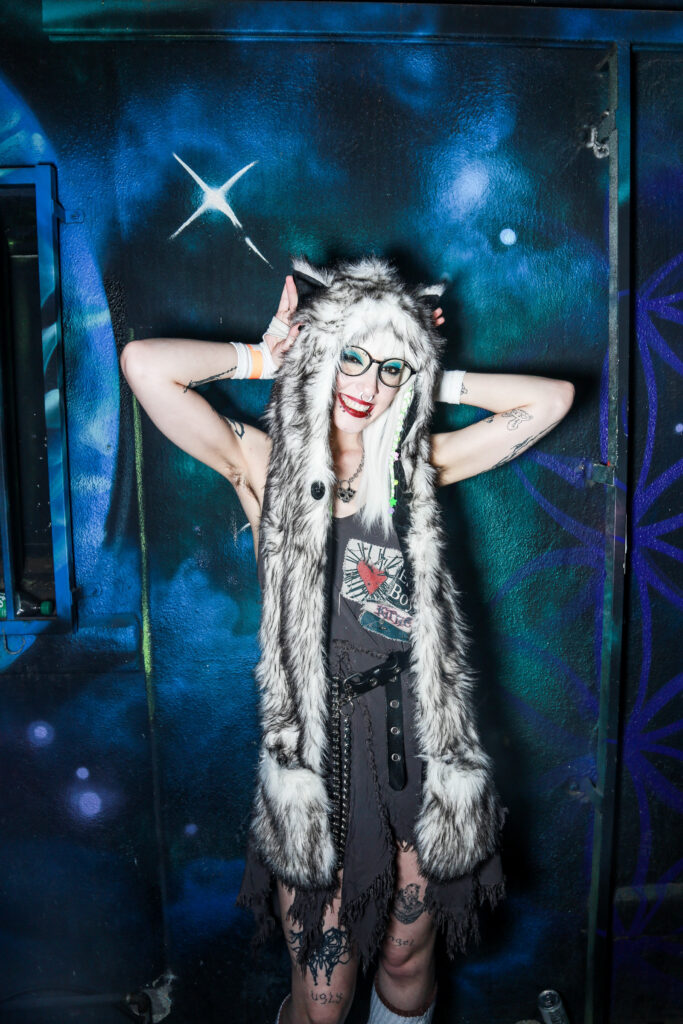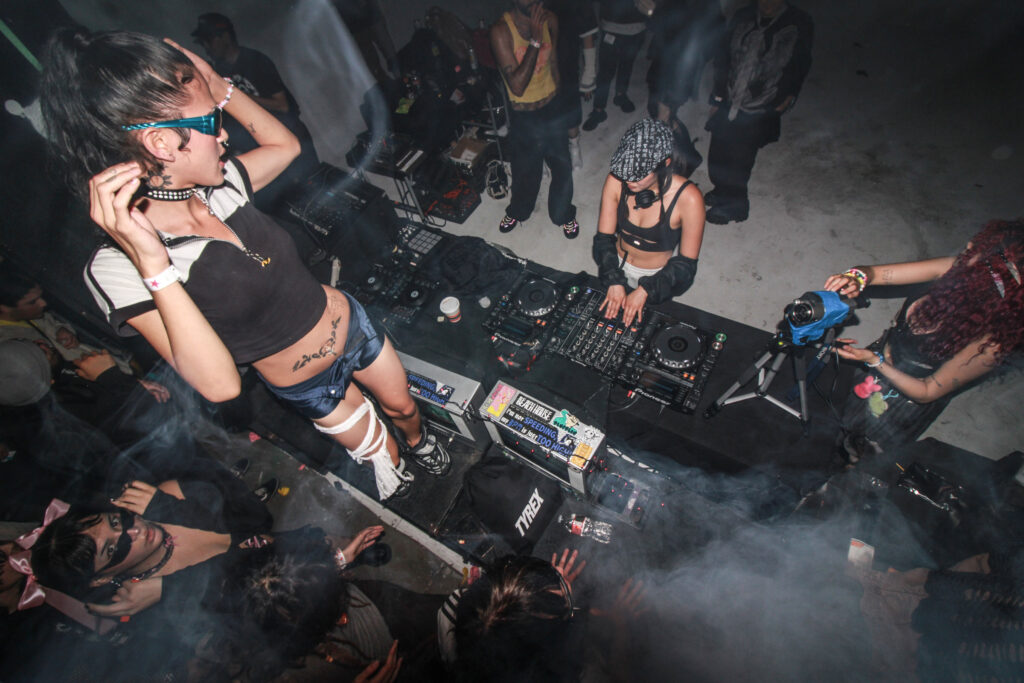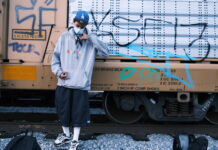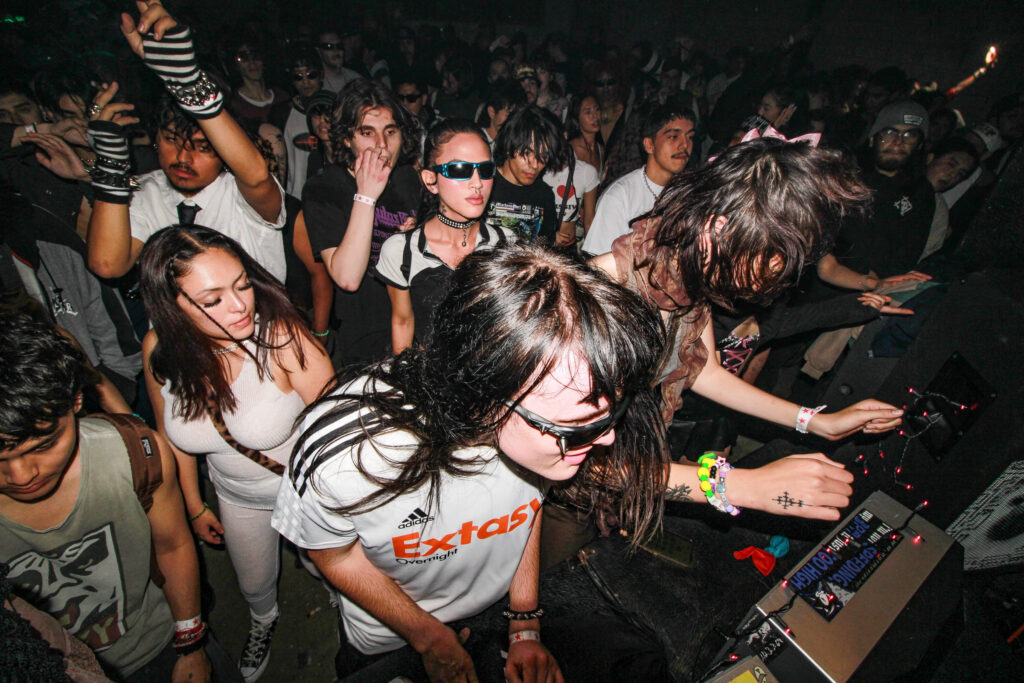
When the sun goes down and the clock strikes 10 p.m., ravers of Los Angeles flock to the streets Downtown following their map of directions—and the noise—to reach venues.Partygoers receive the location from an automated infoline that was released a few hours before the beginning of the party. Getting closer to the venue, the sound of electronic music fills the air. Attendees reach the destination and are met with security asking for identification. While the party is illegal because it’s not a designated space for the type of music this event will throw, hosts often strive to keep out minors for their safety.
Entering a warehouse that’s more humid than Florida in the summer, sweat fills the air and the energy of the night is felt. The only source of light are the continuously flashing neon strobes that echo through the venue, while the beat of the bass courses through dozens of bodies.
This is a typical Los Angeles rave.
Humans from various walks of life are seen attending these events, most of whom dance for up to six hours almost nonstop. A sense of communal gathering is received as underground raves are a place for non-conforming outcasts to feel safe. However someone identifies, dresses or feels, it’s a judgment free zone.
Ravers often use the phrase “PLUR” representing Peace, Love, Unity and Respect, which is the mantra avid ravers follow. The space is more queer than ever, making the underground scene dominated by the LGBTQ+ community.
“There exists a mutual understanding to escape from the day-to-day grind and society’s view of acceptability. Humans have a tendency to escape,” said Noah Little, a music psychologist who wrote in the article “Why We Rave? The Human Psychology Behind Music Festivals.”
As the 1990’s came to a close, a new generation picked up the techno, gabber and hardcore lifestyles.
The alternative saturated way of life has been revitalized with a modern twist. Ravers are seen wearing handmade beaded bracelets full of color, referred to as “kandis” and are often seen exchanging their creations with other partygoers.
The fast paced music tests the endurance of how long feet can last. The normalities of taking drugs or the consumption of alcohol is consistent in the rave world. Drugs such as ketamine, nitrous oxide, MDMA, LSD, ecstasy and cocaine are used to keep up with the fast-paced dance music.
Narcan is commonly carried to ensure a safe night. Though substance use is common, that doesn’t rule out partygoers who are rocking sobriety.
There are several crews and DJs who host the events for LA creatives to attend.
DJ FLAPJACK
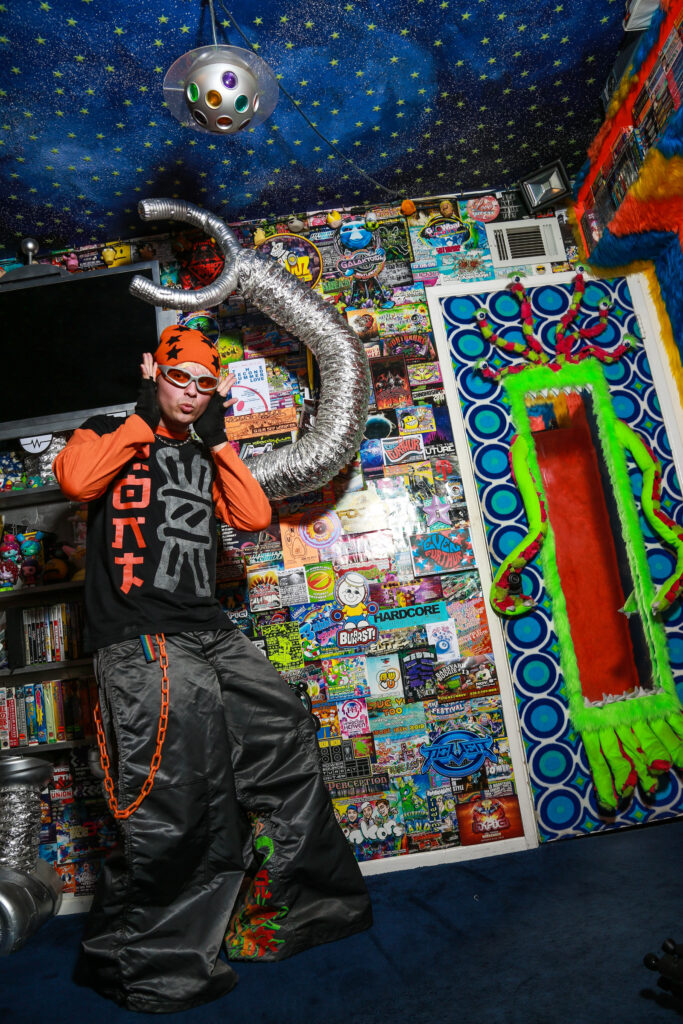
Nathan Norton, otherwise known as DJ Flapjack, is a disk jockey born and raised in Los Angeles. Flapjack is notorious in LA’s rave scene. He’s often seen spinning vinyls with his hands, feet and even chin, creating crazed entertaining sets.
The now 29-year-old has been raving since he was 15 and DJing since 2012. He got into using vinyls, because the music he wanted to listen to was nowhere on digitized formats and only accessible via purchasing hard copy records.
Not only does Flapjack DJ, he also hosts raves, collects, edits and digitizes VHS tapes, makes mixtapes, designs clothing and he helps bring the core communal values of rave culture to Los Angeles.
Many partygoers create nicknames for themselves. Flapjack acquired his as a result of getting picked on in highschool and ran with it. Sometimes, the avid raver plays back-to-back sets with an infamous DJ who goes by the name Baseck. The two are the only ones in Los Angeles currently doing live sets while riding one’s shoulders.
His room contains a collection of more than 4,000 records that have been acquired over the years from all over the world. Flapjack has been booked around the country, as well as throughout Amsterdam and Canada. Out of the wide range of genres he owns, Flapjack resonates with happy hardcore.
The Bull: What is a rave to you?
Flapjack: Aw man… Freedom. Freedom of expression to just do whatever you want and bring whatever you want. Usually like a radical space where it’s relatively safe. The biggest threat to raves are the police.
The Bull: Have you seen any differences between now and pre-COVID?
Flapjack: Yeah! Everyone turned 18 and is going to parties now. It’s super sick to see! Pre-COVID it was there, but not with the enthusiasm it has now.
The Bull: I see you’re immersed in the 1990s PLUR culture… what makes it so special?
Flapjack: It was just like a dying art when I got into it. Everyone was just giving me all this stuff and it was comfortable really. I’m not so much of a nerd about the 1990s. It was just, cool stuff that I like is and was made in the 1990s in a higher quality. Anyone who just has those core ideas of accessibility, high quality, low budget for young ravers to identify with.
The Bull: What genres do you find yourself drawn too?
Flapjack: Happy Hardcore. Gabber. Machina. Bouncy Techno. Anything in the 165 to 200 bpm range. I keep my sets as fast as my slowest record will go. On turntables there’s nothing digital that will tell me how fast I’m going. I just know because that’s what people have told me.
The Bull: Do you see any similarities between now and what you’ve observed from the 1990s?
Flapjack: There’s still a lot of people fighting for accessability and I think it’s kinda the one thing that can’t be capitalized on, I guess. A lot of the 1990s music is coming back and just the do-it-yourself aspect.
The Bull : Has DJing had a profound effect on your life?
Flapjack: I think, yeah. I would not be the same person if I wasn’t DJing, but it’s something I’d naturally do even alone by myself. It’s had a profound effect on my bank account! But like, my life as a person, I mean, I would naturally be a consumer of the music if I wasn’t DJing it, I just have to DJ it or it goes away. If everyone else was doing it, I’d probably shift my focus to something else, but I like DJing. I like spreading the music.
POWERSOURCE
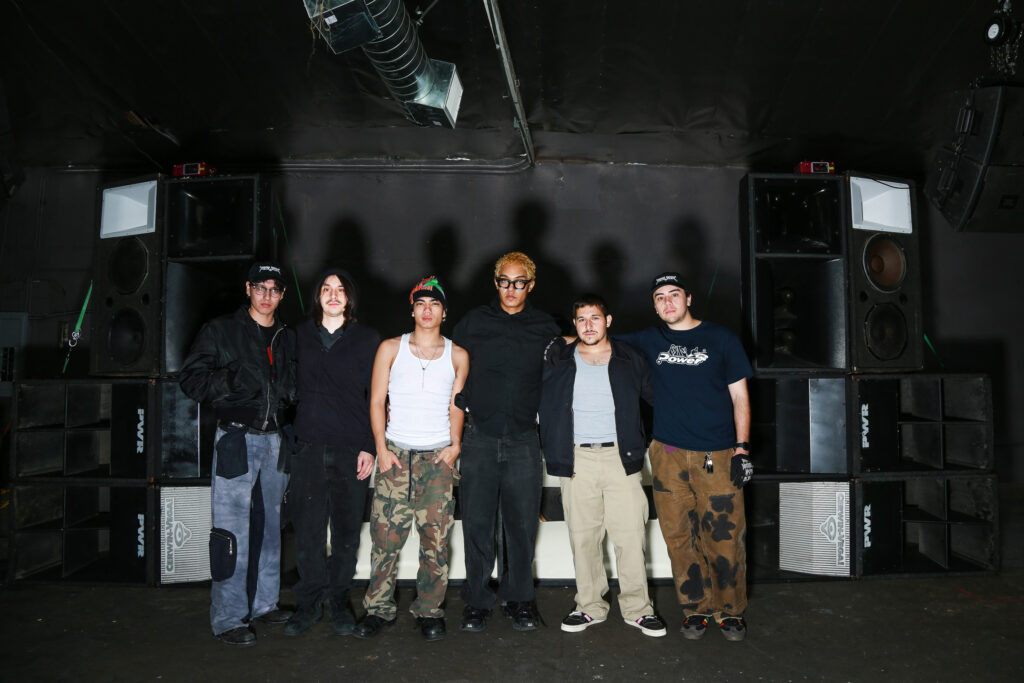
The crew Powersource is a group of multifaceted creatives known for throwing extravagant raves and renegades.
David Morales, Brandon Coco, Isaiah Hearing, Isaiah Gabriel, Javier Vasquez and Henny Fay are a group of friends who handle all the essential elements in throwing a rave—graphics, animation, sound, talent, business and the electrical aspect.
Powersource started as three friends throwing parties with house music as the main genre in La Puente. Their name prior to blooming into Powersource was Youth of Prosperity. Since then, it’s expanded to six buddies who are one of the leading crews of the rave scene with their idiosyncratic ways. They began hosting their own events in October of 2021.
The genres you’d find at their parties consist of hard-style, techno, gabber, trance and many other worldly electronic genres. Their promotional advertisements have consisted of pills that dissolve in water, transforming into the unique rave fliers.
The Bull: What’s the process of throwing raves?
Brandon: It’s like a balance between creative and logisitcal. Finding a space to throw the event, having the resources to get speakers, investing the money properly. Yeah there’s a whole business side of it. We’ve been lucky enough to have people that have warehouse spaces so we can get it at an affordable price, but honestly a lot of our success has been connection based.
David: I mean it’s a whole process bruh.
Isaiah G: It starts off with the idea.
David: The whole process is really like hitting up people that DJ good music who we really fuck with, it kind of starts off like that and then putting all our heads together and coming up with ideas like how to promote this and budgeting.
Isaiah H: Also trial and error.
The Bull: If you guys ever blow up would you ever change the way Powersource functions?
Crew: No!
Isaiah H: I don’t think we could.
Isaiah G: It wouldn’t be the same.
David: I mean if we blow up, we could potentially put on newcomers who deserve to get the shine and give them that platform. I feel like that’s what Powersource is. We like to bring new people on, people like in the scene already too.
The Bull: Do you guys prefer Powersource as an underground event only a niche group would attend, or would you like all walks of life to take part of it?
Isaiah G: I think everbody’s welcomed, but it definitely appeals to a certain group of people. Not everybody can come enjoy the type of music that we have. Some people prefer to listen to House or something more chill and we don’t usually host those types of DJs.
Brandon: Yeah it’s a niche crowd. I feel like ever since we created Powersource, it’s always been about
community. It’s not just about raves for us. We would like to throw hardcore shows. We’d like to delve into other sorts of media, but it takes time to develop those things and also money unfortunately.
The Bull: What do you think partygoers should keep in mind when attending your events?
Henny: Being mindful of everyone around and everyone’s identity. Respect everyone.
The Bull: What’s the best part about throwing raves?
Isaiah G: Definitely for me in the beginning when I was throwing the free parties and stuff, it wasn’t ever about the money. It was just like ‘throw a party. Throw something fun for everybody.’ There’s this movie that I have to refrence. It’s called “Groove” and he talks about it and it’s so true and it’s just “the Nod.” The Nod like ‘Yo. You put on that fucking sick ass party. I went to that.’ Some people have the craziest time and it blows their mind. It could be something so small and then they got respect for you for that because you put on a great party.
David: It always feels good when people, even for me and the graphic side of it when people say “damn, you made that flier? Who made this flier?” It makes me think “damn, people appreciate the work I’m doing now.” We’re honestly doing it for the people, and for us, because we enjoy it. It always feels good when we get good positive feedback.
The Bull: Where do you guys see yourself in five years?
Isaiah G: In five years, you will know Powersource.
Henny: Based off what we’re into in the moment, it’s like a collaboration within all of us so it’s like, who’s to know what we’re into in five years.
Isaiah H: There’s a lot of routes we can go.
David: I feel like we’re definitely going to evolve and just do a bunch of shit that we always wanted to do.
Powersource is more than what we’re doing right now.
Infohazard
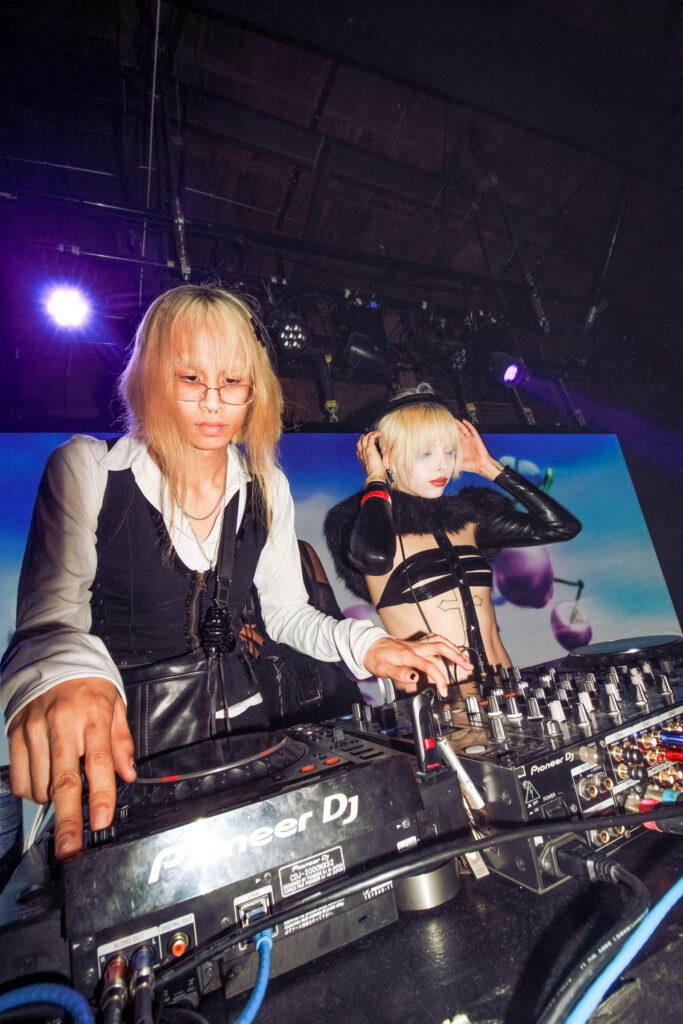
Casper Go is an LA based DJ originally from San Diego, but most ravers know her by the name Infohazard.
Her journey started in October of 2021 when she was introduced to the electronic music scene.
She dedicates that rave as the event that pushed her to transition, which was an eye-opening experience to the huge LGBTQ+ rave community.
“Both things kind of go hand in hand, being trans and a raver,” Go said. “They’re connected.”
Since then, she has been seen DJing weekly, as well as throwing renegades and raves with other friends who are passionate about the scene as well.
Out of many genres in the electronic field, Infohazard is immensely attracted to the breakcore style, which derives from jungle, hardcore and drum and bass of the 1990’s.
The Bull: What’s the best part about DJing?
Infohazard: Playing your friend’s music, seeing your friends, the friendship. But also there is something about DJing or just performing live that I think is just inherently like, very cool and awesome. I just like feel so cool up there.
The Bull:What is rave?
InfoHazard: Rave is a gathering of like a bunch of small parts and those small parts come together and experience a cathartic moment. In that moment it becomes like a single celled organism.
The Bull: What hardships have you run into?
Infohazard: Definitely finding a balance between raves, work, trying to survive, my life stuff, making music and trying to play video games in between that.
The Bull: Is there a certain BPM you like to keep your sets at?
Infohazard: It’s everchanging, but I’m usually between 160 and 180 beats per minute.
The Bull: Is there a location you’ve played at that is superior to the rest?
Infohazard: Mine is the tunnel, obviously. It just means so much to me. Even more so having thrown that party that was like a really very magical spiritual night I really enjoyed it.
The Bull: Whats the feeling you get when you look up to see a crowd dancing to a set you thoughtfully
curated?
Infohazard: Sometimes I’m just like “Damn, I kinda slayed that shit.” Honestly, I don’t look up. There have been times where I have not looked up or if I do something cool, I look back to see if my friends caught it.
